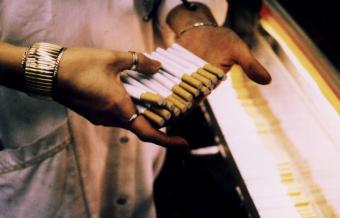 |
FABRIK/LEBEN Factory/Life Alfred Behrens Deutschland 1998 Produktion: zero film, ZDF/Das kleine Fernsehspiel. Weltvertrieb: zero Film, Lehrter Str. 57, 10557 Berlin, Deutschland. Tel.: (49-30) 390 66 30, Fax: (49-30) 394 58 34. e-mail: zerofilm@bln.de Buch, Regie: Alfred Behrens. Kamera: Johann Feindt. Ton: Ulla Koesterke. Schnitt: Annette Muff. Redaktion: Liane Jessen. Herstellungsleiter: Martin Hagemann. Format: Video, Farbe. Länge: 60 Minuten. Sprache: Deutsch. |
Arsenal Do.11.02.1999 17.30 |
|
| Alfred Behrens’ Dokumentarfilm ist eine sorgsame Außenansicht, die die externe Außenaufnahme nutzt, um in tiefere Seelenlandschaften vorzustoßen. Dabei ist der Film über die Frauen an den Fließbändern und automatischen Maschinen der ‘British-American Tobacco Works Bayreuth’ zwar eine kleine Sozialgeschichte über deutsche Frauenarbeit in einem renommierten Industriebetrieb geworden, doch hinter dem Allgemeinem wird auch der familiäre Leidensweg einer Mutter, jener von Alfred Behrens, asynchron eingeblendet, die ihrerseits, unter wesentlich schärferen Bedingungen, eine Familie durch die Arbeit in der Zigarettenfabrik durchgebracht hat. Eine Fabrik, als Kristallisationspunkt für den Export des Rauchens und der Sucht, zeigt gestandene Frauen und Arbeitsschicksale, die den Zuschauer allenthalben in Lebenssignaturen Einblick nehmen läßt, die alles andere als oberflächlich sind.” Christian Hörburger |
A documentary about cigarettes
and a cigarette factory, about the women who work at the cigarette machines
and a film for Irma Auguste Albertine Wüpper (1907-1989). 11,000
cigarettes per minute, at the end of the shift 4 million cigarettes.
The end of the shift is at six in the morning: time to leave the factory.
'It is great when the machines are running, for the company, but also
for us.' At six in the morning - back to life, to successful and unsuccessful
relationships, daily happiness, daily unhappiness: 'I always had to
fight my way in life.' |
| Biofilmographie
/ Biofilmography Alfred Behrens wurde 1944 geboren und wuchs in Hamburg auf. Er machte eine Lehre als Verlagskaufmann und studierte an der Meisterschule für Graphik, Druck und Werbung Berlin. Er arbeitete als Werbetexter, 'Programme Assistant' bei der BBC, übersetzer und Journalist. Alfred Behrens lebt seit 1971 als Autor und Regisseur von zahlreichen Hörspielen, Kurz-, Kompilations-, Dokumentar- und Spielfilmen in Berlin. Seit 1987 ist er außerdem als Dozent tätig. Alfred Behrens was born in 1944 and grew up in Hamburg. He trained as a publisher and studied graphics, print and advertising in Berlin. He worked as a copy writer, programme assistant for the BBC, translator and journalist. Since 1971 Alfred Behrens has written and directed numerous radio plays, short films, compilation films, documentaries and feature films in Berlin. Since 1987 he has also worked as a lecturer. Filme 1976: Der Tod meines Vaters. 1978/79: Familienkino. 1980: Sie verlassen den amerikanischen Sektor. 1982: Berliner Stadtbahnbilder; Teufelsmoor – Beschreibung einer Landschaft; Mottenburger Alltag. 1985: Walkman Blues. 1989: LocoMotion (Regie zusammen mit Michael Kuball). 1990: CineMemo (Regie zusammen mit Michael Kuball). 1991: Volkskino (Regie zusammen mit Michael Kuball). 1994: Volkskino II. 1995: Boogie Woogie Victory. 1998: FABRIK/LEBEN. |
|